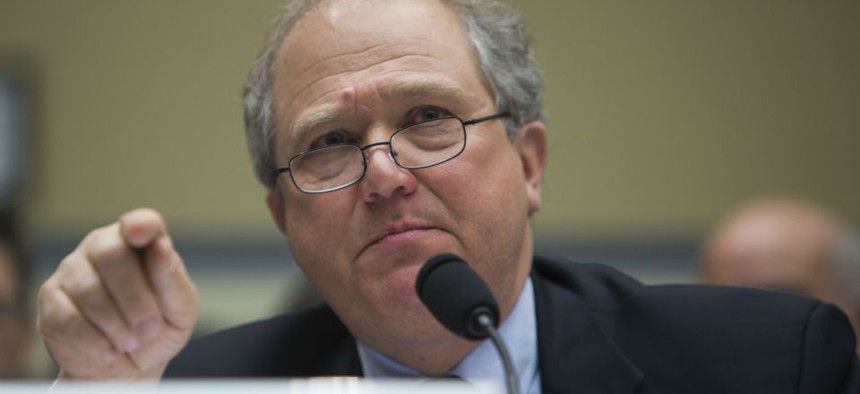
SIGAR John Sopko Special Inspector General for Afghanistan Reconstruction
Watchdog Creates High-Risk List for Afghanistan Reconstruction
Special IG Sopko warns that corruption could derail U.S. effort to build Afghan self-sufficiency.
Two days after U.S. forces lowered their flag for the departure of most troops from Afghanistan, the special inspector general on Wednesday warned policymakers against allowing attention to the war-torn country to drift, and he unveiled a new “high-risk list” of factors that could complicate that country’s transition to self-sufficiency.
Topping that list is corruption and the rule of law, said John Sopko, special inspector general for Afghanistan reconstruction, in a formal speech at the Carnegie Endowment for International Peace. “Each of the seven risk areas is a potent threat to the reconstruction mission,” Sopko said. “But because corruption is so pervasive and so destructive in every area of Afghan life, it leads our list of high-risk areas.”
The new list, modeled after the Government Accountability Office’s biannual governmentwide compilation of at-risk programs, is designed to shape the reconstruction challenge by highlighting “areas that are especially vulnerable to significant waste, fraud and abuse.”
The other six areas are: sustainability of reconstruction investments; the capacity and capabilities of the Afghan National Security Forces; on-budget support and auditing of billions in U.S. funds; a counternarcotics program addressing the Afghan economy’s dependence on opium; contract management and oversight access (including future creation of a central contracting database); and improved implementation and operational planning for execution of multi-agency strategy for fulfilment of reconstruction goals.
The list flags “program areas in which SIGAR believes implementing agencies are failing to mitigate risks in their areas of operation, and will help us generate actionable and substantive recommendations for executive agencies, Congress and the new Afghan government,” Sopko said. “You will note that I spoke of mitigating, not preventing them or eliminating them entirely. Even in countries at peace, there is no such thing as a risk-free project.”
But in a conflict zone, risks of waste, fraud and abuse multiply, he added. “American taxpayer dollars and our strategic and humanitarian interests in Afghanistan are being placed at unnecessarily high levels of risk by widespread failure to track results, anticipate problems, and implement prudent countermeasures,” he said. “And, unlike countries at peace, those problems can lead to lives lost and our national security objectives hindered or denied.”
Sopko expressed hope that the list would also be used by the newly installed president and CEO in Kabul. But he warned that a “toxic dose of corruption could … produce a disaster in Afghanistan. A security collapse would pull down most of our hard-won gains in rule of law, health care, education, women's rights, and economic development. That would be a tragedy for the people of Afghanistan—and for the American taxpayer.”
As he often does, Sopko stressed that his agency feels compelled to generate publicity for its efforts, not because his team is egotistical, but because “you can’t have change without transparency and publicity.” His agency’s “little auditors in their green eyeshades are just as important as officials who attend conferences,” he said. SIGAR is the “largest oversight presence” in the region and “the most independent with the broadest reach,” he added, noting his authority to monitor the Defense, State, Treasury and Agriculture departments, the U.S. Agency for International Development and the trade agencies.
“Those agencies are just trying to do their best in difficult situation,” Sopko said.
In the coming months, SIGAR plans reports from its new “Lessons Learned Unit” for future reconstruction efforts. “Driven by our statutory mandate, our work has included details of U.S.-funded clinics without staff or medicine, schools that can collapse, contracts that weren't performed right or at all, aircraft that the Afghans can't fly or even maintain, troop rosters that can't be verified, cash assistance that can't be traced, and many other outrages,” he said. “The mountains of details in our many products are valuable, but their granularity needed to be complemented with a higher-level view of the areas in which reconstruction is at risk.”
Though reluctant to be drawn into policy debates, Sopko acknowledged to his Carnegie host that he thinks Congress should consider conditioning foreign aid more on proper accounting. “International assistance can’t be a blank check,” he said. Too often for some agencies, “the policy objective trumps corruption [as if] the ends justify the means.”







